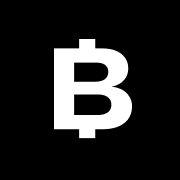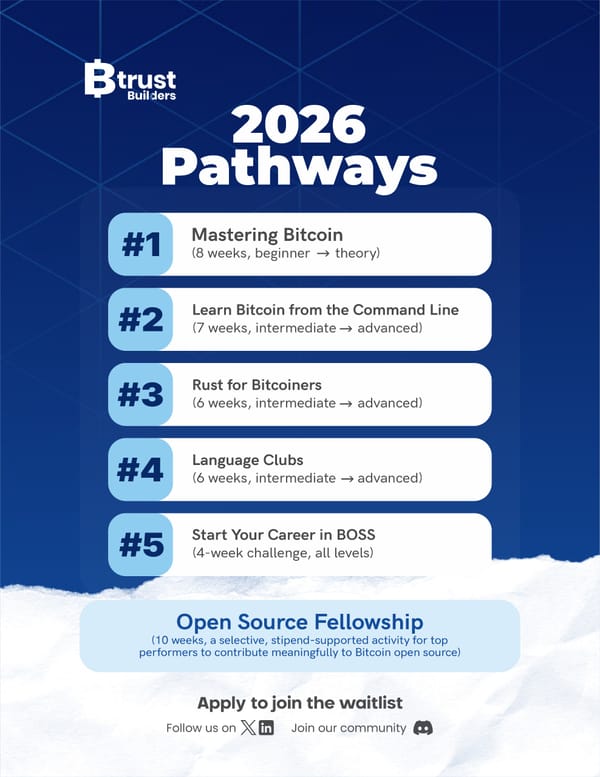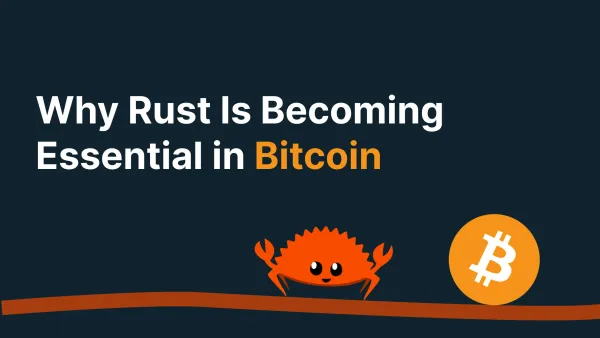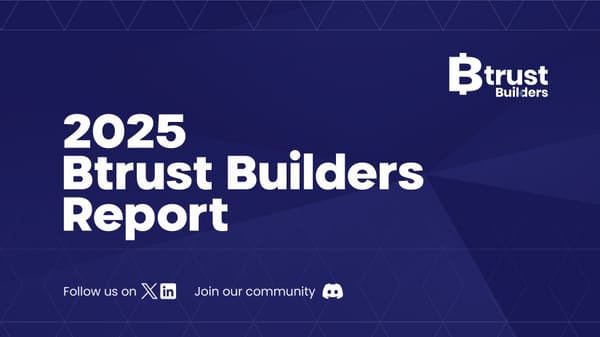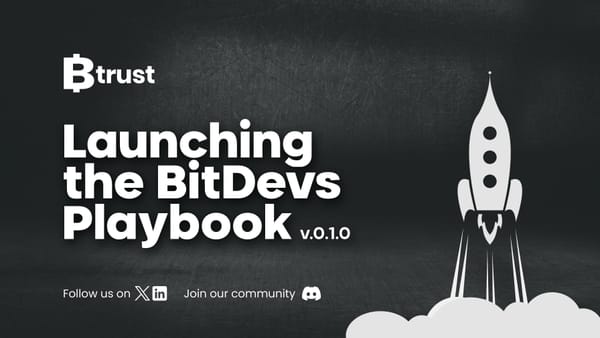From Night Time Coder to Full-Time Bitcoin Builder: My Journey Through Btrust and the BOSS Program
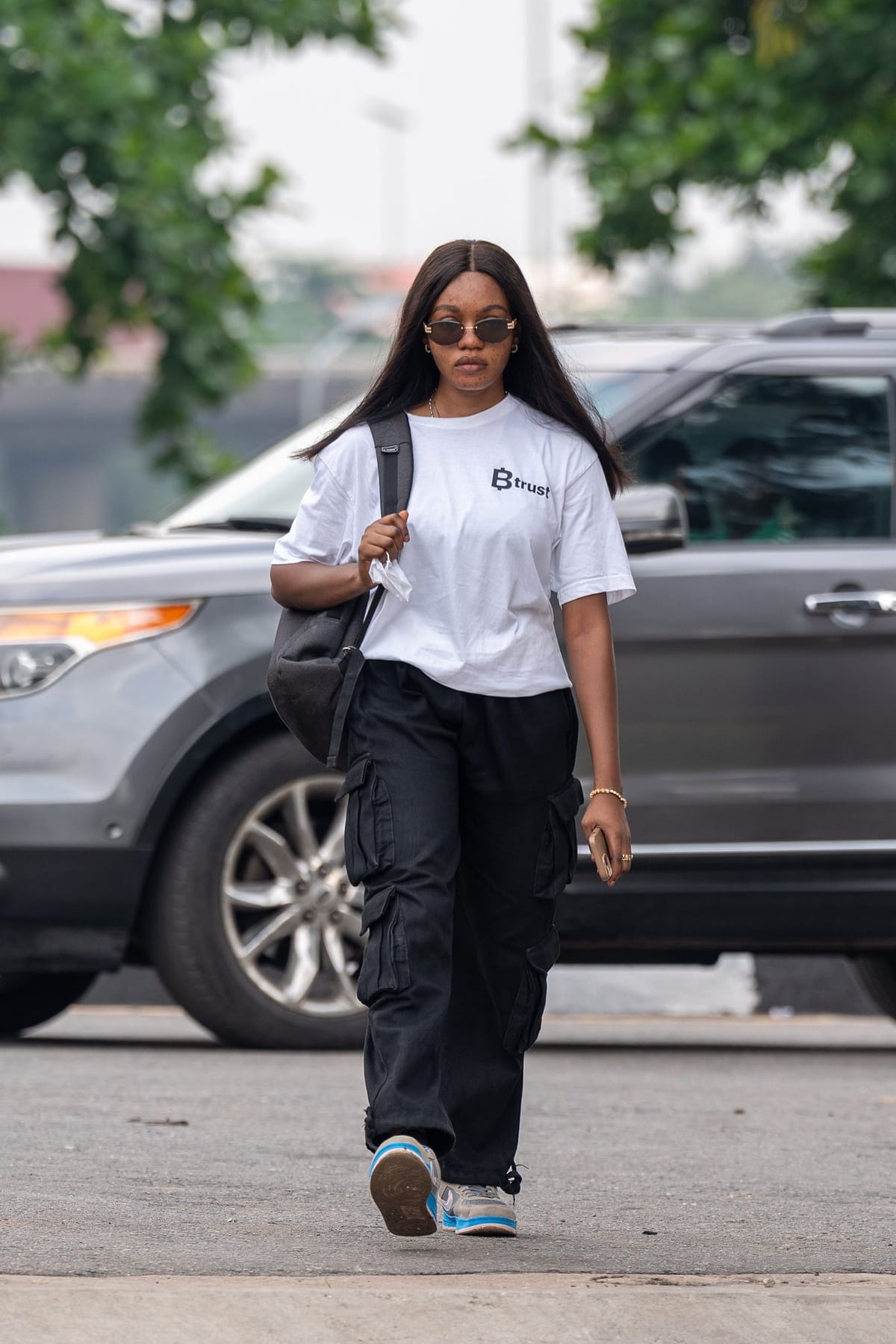
Written by Rita Anene
For over three years, I've worked as a software developer, building features and solving problems in the familiar rhythm of a 9-to-5 job. But something was missing. I wanted to work on technology that wasn't just functional, but foundational, something that could reshape how people interact with money and trust itself.
That's what led me to Bitcoin.
Discovering Bitcoin's True Potential
I first heard about bitcoin in 2018, but back then, I only understood it as "internet money". Over the years, I picked up bits and pieces, but my understanding remained surface-level. Then, in 2024, everything changed when I discovered an entire development ecosystem of developers working on Bitcoin protocols and projects that utilize Bitcoin's full potential.
This is when I found Btrust, a Bitcoin-focused organization dedicated to education and empowering new builders. Learning about their work sparked something in me. I realized that decentralization wasn't just a buzzword; it was a paradigm shift I wanted to be part of.
The BOSS Program
Btrust Builders, in partnership with Chaincode Labs, ran the 2025 Bitcoin Open Source Software (₿OSS) Starter Program, an intensive, three-month cohort designed to onboard developers into Bitcoin's open-source world. The program description was both exciting and intimidating.
During registration, I received my first taste of what was to come, which included instructions to read the first three chapters of Mastering Bitcoin and to learn Rust through a Building Bitcoin in Rust course. I completed the entrance challenge, and by the first week of January 2025, I was accepted into the program.
The program officially kicked off in January 2025 with Week 0, an RPC Scavenger Hunt using Bitcoin Core and Bash scripting, along with reading the first three chapters of Mastering Bitcoin. This wasn't going to be easy. I was juggling this intensive program with my full-time job, so I became what I later called a "vampire coder", working after hours, late into the night, and throughout weekends.
I read those chapters during my commute, treated weekends as deep-dive sessions, and found myself genuinely excited about this completely different world from my daily office tasks.
The Structure
The BOSS program was designed across three months, which was focused on code-heavy Bitcoin and Lightning fundamentals.
Each week brought new challenges alongside new chapters of Mastering Bitcoin. Week 4 was my turning point—the Lightning Network. I'll never forget that moment when Lightning clicked for me. I didn't fully understand it initially, but something about its elegance (instant payments, smart routing, off-chain scalability) captured my imagination completely. The Lightning challenges became the ones I solved fastest, not because I was an expert, but because I was genuinely excited.
First Real Contribution: Warnet and Circuit Breaker
Month 2 arrived with its challenge: build a Proof of Concept. From the available projects, I chose to integrate Circuit Breaker (a monitoring tool for Lightning nodes) into Warnet (a Bitcoin/Lightning network simulator).
This was my first time contributing to a Bitcoin project. Honestly, my hands were shaking as I forked the repositories. The task required me to learn YAML, Kubernetes, and Warnet's plugin architecture, all while maintaining my day job.
I submitted my first PR suggesting one approach, but the maintainer guided me toward a better solution: implementing Circuit Breaker as a Kubernetes pod rather than a plugin. Through this process, I learned about pods, container orchestration, and how Warnet actually works. After reviews and revisions, my PR was eventually merged. Now, anyone can run Warnet and choose to add Circuit Breaker as a pod running alongside the LND (Lightning Network Daemon) pod.
Finding LDK Node
While working on Warnet, I had already set my sights on my next challenge. Since I'd fallen in love with Lightning, I wanted to contribute to a Lightning-focused project. Two projects from a site Btrust shared caught my attention: BDK (Bitcoin Development Kit) and LDK Node (Lightning Development Kit Node), both Rust-based. My heart was set on LDK Node, a Lightning implementation in Rust.
Here's where things got real. Open-source can be intimidating, especially when you're new. The issues felt impossibly complex. The codebase was dense, and I was still learning Rust. I started second-guessing myself, wondering if I should switch to a project with more beginner-friendly issues.
Community and Mentorship
Btrust Builders had assigned me a mentor, Theophilus, who, along with Tobechi, a Btrust grantee working on BTCPay Server, gave me advice that changed everything:
"Don't jump ship. Pick any issue, research it thoroughly, and start working on it. Read the codebase over and over again. Go through PRs (both merged and open) and you'll gain understanding."
When two experienced Bitcoin developers are saying the same thing, you listen.
Around the same time, I was connected with Eni, a contributor to LDK Node, who welcomed me and confirmed that it was a fascinating project to work on. Her encouragement meant the world to me.
I also started attending the BitDevs Lagos meetups in January 2025. My first BitDevs was eye-opening, meeting like-minded people, learning from their experiences, and realizing I wasn't alone in this journey. By June, I was confident enough to host a session myself.
Breaking Through: My First PRs on LDK Node
Following the advice received, I stayed with LDK Node. I picked an issue, researched it, understood the problem, and crafted a solution. My first PR was a learning experience. It got reviewed, changes were requested (expected for someone new to the project), but eventually, it was merged.
That first merged PR was a breakthrough moment. Suddenly, the codebase started making more sense. I went on to create a second PR, each one teaching me more about LDK Node internals.
Let me tell you about trying to get the project running locally, that was an adventure in itself. I went through hoops trying to figure out the testing setup, but eventually found a workflow that let me test my changes before submitting PRs. (I now know a better approach and plan to write about it soon.)
The Btrust Starter Grant
All of this (the PRs, the code reviews, the late-night debugging sessions) was happening while I maintained my full-time job. I was essentially only able to attend to reviews, create PRs, or research issues after work hours, at night, or during weekends.
Then came life-changing news: I was accepted for the Btrust Starter Grant for Q3 2025.
This wasn't just funding, it was the opportunity to contribute to Bitcoin open source full-time. No more waiting after work hours or until midnight to open my IDE. For the first time, I could work on Bitcoin development during the day, not just as a nighttime vampire.
Since receiving the grant, I've been able to dive deeper into research, create two more PRs on LDK Node, and significantly deepen my understanding of LDK Node. I've learned that this ecosystem isn't just about coding, you need a deep understanding of what you're building and how it works.
My journey involves continuous research into not just Bitcoin, but Lightning Network protocols, strengthened by ongoing study of Mastering Lightning Network and improving my Rust skills.
What I Learned
The BOSS program taught me that Bitcoin development is collaborative. I learned enormously from peers at different experience levels. Some knew more about Lightning and Bitcoin than I did, while I was able to contribute knowledge in areas where I had more experience. This diversity of backgrounds and expertise made the learning environment rich.
One thing became clear: you don't need to be an expert to start contributing. What matters is curiosity, persistence, and willingness to learn. Some problems require looking at them more than once or twice before understanding clicks. The key is not giving up when things seem complex.
What's Next
My journey is far from over. Over the next few months, I plan to gain deeper knowledge of LDK Node and Lightning Network's protocol design, strengthen my Rust proficiency, and gain an understanding of Bitcoin's layered architecture. Most importantly, I want to guide others as I've been guided, especially in Africa, where Bitcoin's potential for financial sovereignty is real.
Working on Bitcoin isn't just about the technology, it's about building infrastructure for a more open, decentralized financial system. Every PR, every code review, every late-night debugging session contributes to something larger.
Gratitude
I'm grateful to Btrust, Chaincode Labs, my mentors Theophilus, Tobechi, and Eni, my BOSS cohort peers, Tnull, the maintainer on LDK Node for being welcoming and his guidance during PR reviews, and the wider Bitcoin open-source community. You didn't just teach me how to code, you showed me how to build with purpose and conviction.
To anyone starting out: it's okay to feel lost initially. It's normal to not understand Lightning or Bitcoin's complexities on the first try. What matters is showing up consistently, asking questions, and trusting that the community (when you engage with humility and genuine curiosity) will support your growth.
The path from curious developer to Bitcoin contributor isn't always smooth, but it's rewarding. And now, for the first time in my journey, I get to walk this path in the full light of day, contributing to the future of money and freedom.
The vampire coding days are behind me. The real building begins now.
